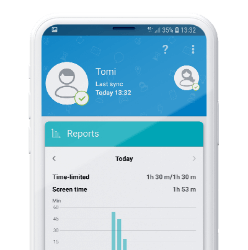Is AI enabling a new wave of cyberbullying?
The digitally native generation uses digital means to have fun, but also to hurt each other.
Children are spending more time online than ever before. In fact, according to Ofcom, 99% of all children went online last year, with the majority using a mobile phone (72%) or tablet (69%) to do so. However, whether they go online to do their homework, play games, or chat with their friends, we must do all we can to protect them, not least because an astonishing 84% of children's bullying happens online, through social media, within apps, forums, gaming, or elsewhere.
Cyberbullying has sadly become endemic. So much so that the prevalence of cyberbullying has doubled since 2007. Part of the trouble, of course, is that the internet provides anonymity, emboldening bullies to act out online more than they would in the classroom.
There are a few warning signs to watch out for if you are concerned your child is being bullied.
Is your child suddenly showing less interest in their computer or “forgetting” to take their phone with them when they leave the house? Are they failing to check their messages regularly? Do they appear upset after spending time online? Or are they inventing a mysterious illness to avoid school?
If the answer to any of these is yes, then it’s important to have an open and honest conversation with your child. Whilst cyberbullying is a difficult subject to approach, and for children to open up about, your child will thank you in the long run if your suspicions turn out to be true. Make sure you keep an open and non-judgmental mind, so your child feels confident to share problems with you. Once they open up, show support by drawing up a strategy together about how you will respond to cyberbullying and what happens next.
Whilst, unfortunately, the threat of cyberbullying has never been higher, there are a few things you can do to help mitigate this. The first is to understand what your child is doing online, which apps they use, and which sites they visit. Often there are safety features and parental controls you can activate within these apps and sites to help maintain their privacy and prevent unsolicited contact.
Secondly, educate your children on the importance of not sharing their personal details or photographs and videos online, whether with friends or otherwise. Thirdly, ensure they know how to report things that upset them and block the people in question. Finally, encourage your child to be a good digital citizen and share this great list of suggested ‘netiquette’ with them to help them know how.
The internet and social media may have changed how children experience bullying, but the emotional impact continues to be devastating. To help you support your child on this issue, Internet Matters has created a hub of advice – check out the site for advice on how to prepare them for what they might encounter online, how to deal with it, and practical ways to tackle cyberbullying should it happen to them.


With ESET Parental Control for Android
TRY FREE FOR 30 DAYSThe digitally native generation uses digital means to have fun, but also to hurt each other.
Cyberbullying can significantly affect children’s confidence and cause them to lose hope in the kindness of others. Especially if they are left to deal with their emotions on their own. How should parents proceed when they think their child may be a victim of cyberbullying? And how can they help them get back on their feet? We discussed the topic in detail with Jarmila Tomkova, a child psychologist.
As in the real world and also online, your kids may encounter inappropriate behaviour as well as initiate it. How can you guide them to make the right choices and avoid making and affiliating with wrong choices?